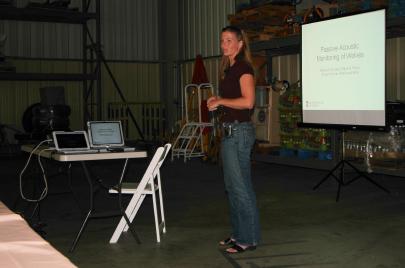
|
|
July 17, 2007 San Diego State University Masters Student Deborah Curless is finishing her HPWREN-related thesis on networked acoustics sensors at the California Wolf Center
Researchers at SDSU have created a distributed system to collect and classify the calls of wolves. Data is acquired automatically from a sensor node on the HPWREN network at the Calfornia Wolf Center in Julian, California. When the sensor detects activity, the information is transmitted across HPWREN to a remote processing facility at San Diego State University where a separate component receives and processes the audio detections. The component first performs feature extraction on the detections. Pretrained hidden Markov models are then used to classify the detection. This work was the basis for Deborah Curless's thesis as part of a graduate degree in Computer Science at San Diego State University. Deborah also presented this work at the recent Acoustical Society of America conference in Salt Lake City, Utah. Overall system accuracy on a manually labeled data set is 75%. Accuracy varies between call types. Continuing work includes collecting data from a second sensor in close proximity to the feeding area at the California Wolf Center, as well as testing with varied number of mixtures in the Gaussian mixture models. Other continuing work involves creating a web-based interface to view/listen to classifications.
A PDF version of the thesis is available. A previous May 2006 article about the research can be found at: /news/20060510. Deborah Curless
|
